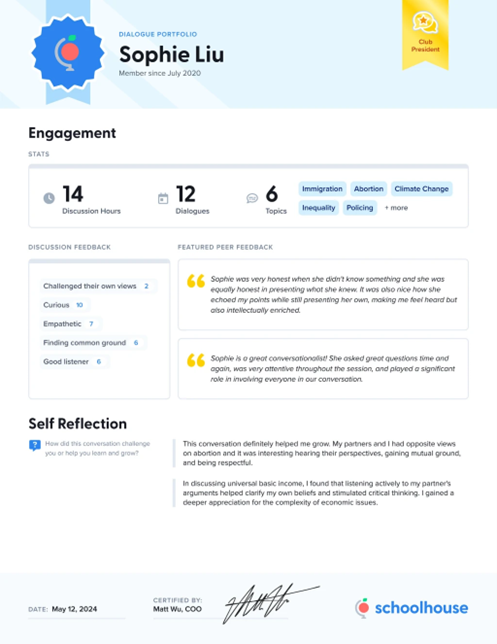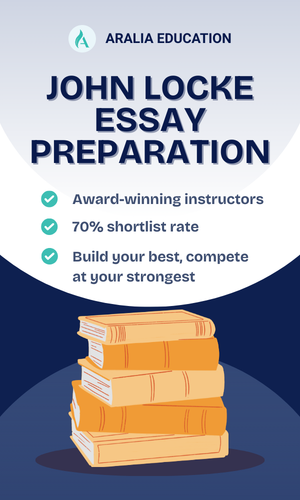1. Schoolhouse and Dialogues Portfolio
Schoolhouse.world is a free, peer-to-peer tutoring platform where learners can receive live help and build academic skills with the assistance of volunteer tutors. The platform is co-founded by Sal Khan (Khan Academy founder) and offers a free 4-week SAT bootcamp. Students can learn from volunteer tutors worldwide, including high-achieving students and teachers dedicated to helping others improve their college chances.
Today, Schoolhouse.world has learners from over 180 countries and a vibrant community of more than 21,100 volunteer tutors and 149,900 learners. Dialogues is a new feature on Schoolhouse designed to build students’ one-on-one conversation and dialogue skills. By attending events or joining Dialogue Clubs, students participate in one-on-one Zoom discussions on topics such as free speech, mental health, artificial intelligence, immigration, gun control, and climate change. These aim to foster respectful civil discourse and help students practice open-minded, informed conversations on complex and meaningful issues.
2. Who can participate in Dialogues?
Students aged 14 to 21 around the world can join Dialogues:
- Dialogue Clubs: Open to students aged 14-21.
- One-Off Dialogue Events: Open to high school students aged 14-18.
Boost Your Public Speaking Confidence Today
3. Dialogue Portfolios
Active students in Dialogues can earn a Dialogue Portfolio, a certificate that demonstrates empathy, open-mindedness, and effective communication skills. This portfolio can be submitted to participating universities as part of college applications.
To qualify for a Dialogue Portfolio, students will need to:
- Participate in at least 3 Dialogue sessions (Dialogue Club or One-Off Events).
- Submit the post-session Dialogues survey & feedback after each session.
Example of a Dialogue Portfolio:

4. How Do Dialogues Work?
Dialogues connect high school students worldwide through one-on-one Zoom conversations on pressing global issues, including immigration, climate change, and artificial intelligence. During each session, students log into a Zoom call with peers and a student facilitator, engaging in respectful discussions and debates. After each conversation, participants rate one another on traits such as empathy, curiosity, and kindness, helping students develop self-awareness while practicing civil discourse.
There are two ways to participate in Dialogues:
- One-Off Events: Join a single Zoom conversation with assigned peers who may hold opposing viewpoints on your chosen topic.
- Dialogue Clubs: Get involved in organizing discussions by scheduling, leading, and facilitating dialogue sessions. Students can take on leadership roles, such as becoming a Dialogue Club President, to help manage discussions and guide their peers in meaningful conversations.
You can explore and sign up for upcoming Dialogue sessions by visiting the event site on Schoolhouse. For more resources and tips on how to participate in Dialogues, refer to these guidelines.
Conversation Policies
Dialogues intentionally allow in-depth, personal discussions on politics and religion, encouraging students to express opinions while respecting others’ perspectives.
Schoolhouse has a policy document to guide students in joining these dialogues. Key policies include:
- Avoid partisan advocacy or proselytizing.
- Criticize ideas/actions, not people/groups.
- Discussions must happen via an unmuted conversation (Zoom chat is not allowed).
- Discussions remain confidential, except for reporting policy violations.
If you observe policy violations, report them to the Schoolhouse team for review.
5. List of Universities Accepting Dialogue Portfolios as Part of College Application
For the 2025-2026 college application season, the following universities will accept the Dialogue Portfolio:
- University of Chicago
- Johns Hopkins University
- Massachusetts Institute of Technology
- Vanderbilt University
- Columbia University
- Colby College
- Northwestern University
- Washington University
Why Universities Support This Initiative:
- Addressing the AI-Essay Challenge: With the growing use of AI tools, it’s becoming increasingly difficult for college admissions officers to determine whether a college essay truly reflects a student’s voice, writing ability, and thought. The Dialogue Portfolio helps bridge this gap by providing admissions teams with authentic evidence of a student’s real-time ability to engage, articulate ideas, and demonstrate empathy in live conversations.
- Promoting Diversity and Inclusive Admissions: Dean of College Admission and Financial Aid from the University of Chicago noted, “I want students who can come here and add to the conversation on campus, but do it in the right way.” This statement reflects what top universities value most: students who bring diverse viewpoints, backgrounds, and ideas, and who know how to contribute to meaningful, respectful dialogue. By accepting the Dialogue Portfolio, universities are expanding their admissions lens beyond GPAs, test scores, and essays to include character traits and real-world communication skills. This approach helps ensure that incoming classes are not only academically prepared but also ready to contribute to thoughtful conversations that enrich the entire campus community.
Get Ahead in the 2025–2026 Admissions Cycle
6. Why Should Students Participate?
While the Dialogue Portfolio can enhance a college application, the benefits go far beyond admissions. Participating in Dialogues is a valuable opportunity for personal, academic, and social growth:
A Platform to Express Opinions: Many students feel they lack a safe space to discuss sensitive or controversial issues openly. Dialogues provide a structured, respectful environment where students can express their thoughts on topics that matter but are not often discussed at school or in their surroundings.
Expand Worldview: Engaging in discussions with peers from diverse backgrounds and cultures helps students gain new perspectives on global issues. They will learn how different cultural, political, and socioeconomic backgrounds shape opinions, developing cultural sensitivity and a deeper understanding of complex issues.
Develop Critical Thinking and Listening Skills: Dialogues are not just about speaking; they are also about listening actively, asking insightful questions, and evaluating arguments with empathy and logic. These discussions challenge students to understand various perspectives and to respond thoughtfully. By participating in these conversations, students can develop the ability to think critically, a key competency for college success.
Build Confidence in Public Speaking: Expressing your opinions respectfully and constructively is an essential skill that extends beyond the academic environment. Participating in Dialogues helps students build confidence in raising ideas, organizing thoughts on the spot, and speaking in a clear and compelling way. These skills are critical for college-level courses and future careers.
7. Some Concerns about Dialogue Portfolios
While the Dialogue Portfolio presents exciting opportunities, students and families need to consider the potential challenges associated with participating:
Additional Workload and Time Commitment
Earning a Dialogue Portfolio requires consistent participation in at least three sessions and completing post-session surveys. For students already balancing demanding academic schedules, extracurricular activities, and test preparation, this can add to their workload. Students will need to manage their time carefully to ensure they can fully engage in Dialogues without compromising other responsibilities.
Accessibility and Equity Concerns
Students from underprivileged backgrounds may face barriers to participation, including:
- Stable Internet Access: Engaging in live Zoom discussions requires reliable connectivity, which may not be available to all students.
- Quiet Environments: Participating in discussions requires a distraction-free space, which may not be accessible to students in shared or challenging living conditions.
- Resource Disparities: Higher-income families have the means to hire coaches or tutors to help students prepare for Dialogues, potentially giving them an advantage in achieving higher scores on the Dialogue Portfolio.
Participating in Dialogues will be a transformative learning experience that helps students become better thinkers, communicators, and global citizens, regardless of how it is used in the college admissions process. As the new college admission cycle is starting soon, students and families should weigh its benefits against potential challenges before making a decision to best prepare for the application.
Prepare for Your Dialogue Portfolio with Aralia
You can improve your speaking skills with Aralia’s experts and prepare for meaningful conversations with peers to develop an impressive Dialogue Portfolio. Students will learn how to structure different types of speeches and receive coaching on discussion style as well as practice critiquing their peers. Our teacher is an honorary member of the U.S. National Communication Association with years of experience coaching students for interviews with top boarding schools.

Intro to Public Speaking
The class is designed to help prepare international middle school students to grow in confidence and excel in oral presentations to their fellow students and administrative/entrance school staff. Additionally, students will be introduced to the major types of speech presentations they are likely to be assigned while completing a public speaking and/or introductory communication course during their middle and high school careers.

Public Speaking and Debate
This Public Speaking and Debate class will offer the opportunity to speak and listen to others talk only as much as possible. We will alternate between learning the structure of different types of speeches and making presentations by one student to the rest of the class. After each speech by students, we will have a critique from the peers, and the teacher. They will also be required and coached on how to participate in the discussion and to critique their peers.








